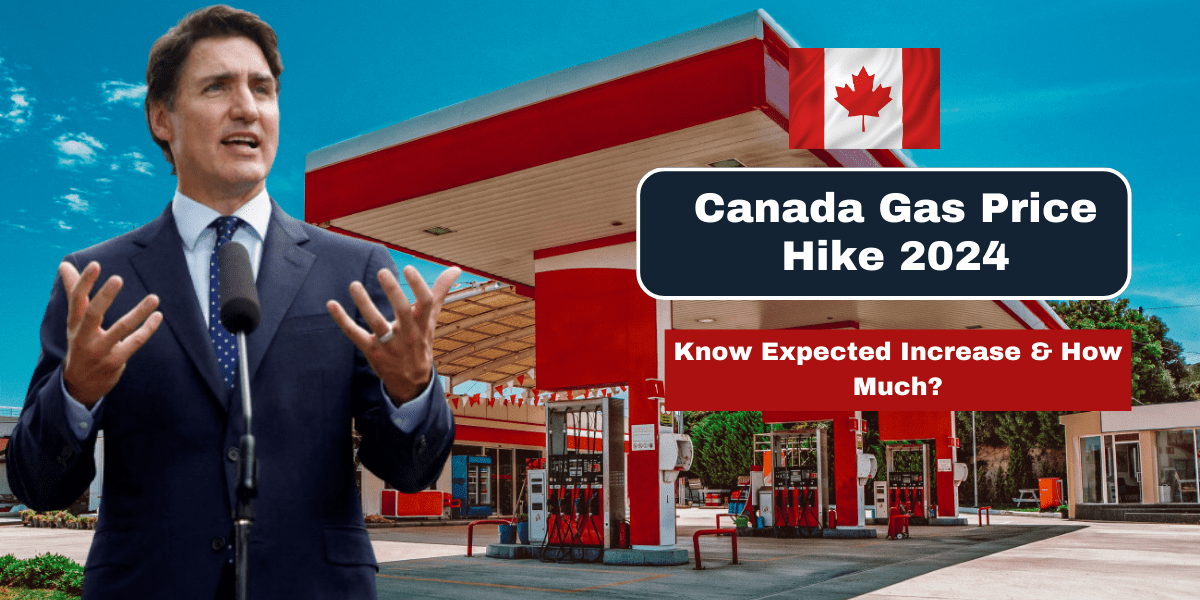According to the latest information, in 2024 the price of gasoline will increase at a rapid rate. This week, the price of a Canadian litre of gasoline rose at an extraordinary rate. The majority of this increase was due to increases in Ontario and Quebec. Canadians have seen their petrol prices rise since the beginning of the year. This is related to global economic shifts.
They are creating a cloud economic uncertainty that affects both consumers and companies. The price of petrol is expected to increase due to various factors, such as the current global economic situation and environmental concerns.
Table of Contents
Canada Gas Price Hike 2024
A government report states that the electricity utility in the province is requesting a rate increase of 2.3%, which would mean an increase of approximately CAD $2 per month starting in April for the average home.
The report states that the current rates are 15.6% lower than overall inflation rates over the past seven years beginning in 2017-2018 and are 12.6% lower than rates set by the previous government in 2013. We estimate that petrol prices in Canada will rise in 2024.
| Carbon Rebate Amounts 2024 25 |
| Canada Pension Plan |
| Extra Tax Refund Money |
| 2700 For Canadian Seniors From Cra |
| Canada 500 Electricity Bill Rebate |
Canada is one the world’s largest producers of this fuel, and the cost of gasoline produced here has also changed over the past year. You noticed that the third quarter of last year saw a 16 per cent drop.
The price of fuel and carbons fell over several years due to a decline in global demand and a reduction in worldwide supplies. Changes in crude oil prices affect power plant costs because crude oil is needed to produce petrol. We discovered during the winter that the price for crude oil was increasing, and we expect that this will also happen with petrol.
Overview on the Canada Gas Price Hike in 2024
| Name | Canada Gas Price Hike |
| Country of Origin | Canada |
| Department / Regulating body | Canada Revenue Agency (CRA) |
| Year | 2024 |
| Categories | Natural resources and energy |
| Current Price (Canadian Dollar/litre) | 1.44 |
| Expected Price (Canadian Dollar/litre) | 1.50 |
| Gas price increases: What’s the reason? | Carbon Tax. |
| Objective | Less carbon footprint. |
| Affected people/industry | Consumers Low income households Transport industry |
Why Is The Price Of Gasoline So High In Canada Today?
Canada Gas Price Hike can be attributed to many factors. It is not a single issue, but a combination of issues. The economics of supply and demand are also a major factor. In response to the Russian invasion of Ukraine, several countries have imposed economic sanctions, including a ban on purchasing crude oil. Russia is an important supplier of this resource.
The price of petrol, diesel, and refined oil has increased due to a reduction in supply on a volatile global market. The global market is the reason for this. There were obvious reasons why the price of gasoline exceeded $2 per litre.
The amount of oil used by people around the world has reached levels before the pandemic, as they are returning to the habits that existed prior to the epidemic. This includes flying, cruising and driving to work. The energy industry shutting down oil fields during the years mentioned above has led to a global oil crisis, and a dramatic rise in crude oil prices.
Reasons Behind The Increase In Petrol Prices
1. The Dynamics of the International Oil Market:
Canada is among the countries who import crude oil net. The Canadian dollar’s value in relation to the US dollar can affect the price of crude. Oil is priced in US dollar around the world, which could lead to an increase in petrol prices in Canada.
2. Environmental regulations and the dynamics between supply and demand are both important factors.
The price of gasoline has increased due to Canada’s commitment to the environment, as shown by its carbon taxes and laws requiring cleaner energies. The price of petrol has increased due to the dynamic of supply and demand. This is further affected by the economic recovery, and the operation of industrial enterprises.
3. Current global economic conditions and production costs:
The price of gasoline in Canada is affected by the global economy, and the oil price. Oil consumption can also be affected by the expansion or contraction in the economy. The final price of petrol will also be determined by production costs incurred due to the availability and cost of raw materials, as well as the margins made from refinement.
4. Seasonal variations, weather events, and questions of international concern:
The fluctuations in petrol prices are caused by a number of factors. These include seasonal variations, increased travel during the peak season, transportation difficulties due to unforeseeable weather events, and geopolitical circumstances, such the conflict between Ukraine & Russia.
5. Instability in politics on a global level and high transportation costs
Political instability in oil producing countries can cause delays in transportation. This may be due to factors like gasoline prices, infrastructure maintenance or major geopolitical events. This causes a change in the cost of transportation between production sites and refineries, resulting in an increase in additional charges.
6. Exchange on the market and taxes:
The rise in petrol prices is also a result of trading on the market. Price fluctuations are likely to be short-term and caused by traders speculating on future price changes.
Prices of petrol can be affected by a variety of factors including taxes and regional differences. This can lead to discrepancies in prices between Canadian cities. The cost of marketing and refining the fuel also affects the final price.
A Current Scenario Of A Projected Increase In The Price Of Gas In Canada
The price of gasoline is currently 1.44 Canadian dollars per gallon. The price could rise as high as 1.50 Canadian Dollars per litre in the next few days if the 2.5% increase continues. These estimates, however, are based only on recent events and the government has yet to announce the price. Analysts believe that, if the global economy becomes more stable, prices could drop by the end the second quarter.
How Can The Increase In Petrol Prices In Canada Affect Investments?
Inflation is a result of the rising cost of transport, which can be seen in high prices for rare and consumer goods.
It is possible that consumers will spend less on other goods and services. This could lead to a drop in the stock price of businesses in the travel, retail, fashion and other industries.
Interest Rates and Bank Policies are Related: Banks consider the inflation rate and economic growth when modifying interest rates. It may lead to possible rate increases and their impact on different asset classes.
Energy Sector Investments: It is possible that the demand for renewable sources of energy will increase. Solar, wind and electric manufacturers are among the industries that stand to benefit from a transition to renewable sources.
Real Estate Market: In areas with reliable public transportation or near employment, prices may increase. This will impact real estate values as well as the expected increase in petrol in Canada by 2024.
Additional Considerations Regarding The Increase In The Price Of Gas In Canada In 2024
Many individuals and businesses in Canada are concerned about the increase in petrol prices that is predicted for 2024. This blog has covered several factors that could affect petrol prices. The elements that affect the price of petrol include supply and demand dynamics, government policies, and oil prices on a global scale. Although it’s difficult to accurately predict the rise in oil prices for 2024, it’s important for Canadians be aware of potential fluctuations and make the necessary preparations.
Individuals can reduce the impact of rising fuel costs on their finances by adopting fuel-efficient behaviors, researching alternative modes of transport, and staying informed about market trends. Keep up to date with the latest news and developments within the energy sector to make informed choices that are both environmentally friendly and economical.




